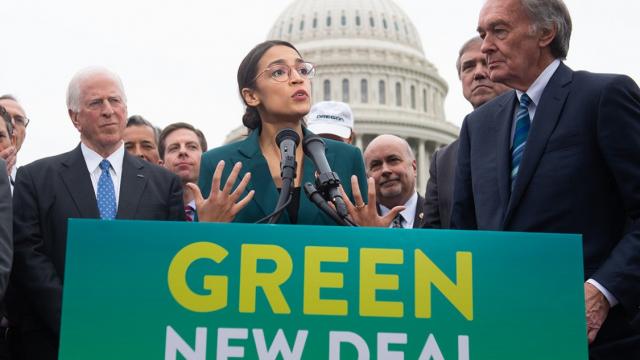
This is the second in a two-part article, looking at the solutions for rural America being proposed by 2020 Democratic presidential candidates like Bernie Sanders, Elizabeth Warren and Jay Inslee. The first installment ran Tuesday.
The first part of this article described the economic and environmental crisis in rural America and ended by asking if any of the Democratic candidates for president understands the problem. The answer is: Yes.
Bernie Sanders
In a speech before farmers in Iowa in early May, Sen. Bernie Sanders called for a range of policies to create a fairer playing field for them. The cornerstone of his approach is a more vigorous application of antitrust laws in order to break up agribusinesses and to block mergers such as a recent one between Monsanto and Bayer.
In addition, the Vermont senator argued that antitrust laws must be applied to the middlemen who use their positions in the market to control prices for agricultural commodities.
Sanders is speaking to the basic issues of existence for people in this region, and he understands their needs. Beyond breaking up the large agribusinesses, it is important to aid small farmers directly. As happened in the past, price guarantees for crops and other products of small farmers would ensure that their operations were sustainable year-to-year instead of being vulnerable to random market fluctuations.
Farmers' financial stability could be further enhanced by providing more choice in acquiring inputs and selling to the market. City and county initiatives to set up local markets would help some small farmers diversify their income streams.
Sanders also talked about the need to hold factory farms accountable for the various environmental harms they inflict on communities, stating that they are a “threat to air we breathe, the water we drink, and the communities in which we live.” He also mentioned the need to get away from monocropping and the resulting degeneration of the soil, and highlighted the potential for soil to sequester carbon and thereby help mitigate climate change.
This mention of soil was seemingly a small point in his nearly hour-long speech, but it demonstrated that he has a comprehensive understanding of the agricultural economy, its role in climate change, and how it should be transformed to help family farms and communities.
Research over the past couple of decades has shown that regenerative farming techniques can sequester a large amount of carbon in the soil. Taken together, Project Drawdown estimates that such agricultural practices – what it lists as the 11th and 16th most important solutions, out of a total of 100 – could pull a large amount of carbon dioxide out of the atmosphere.
Different practices for animal husbandry also have great potential to turn rural areas into places that sequester carbon instead of releasing it to the atmosphere in the form of methane, as factory meat farms currently do.
Were such practices adopted throughout America’s farm sector, the amount of greenhouse gases sequestered in the soil would more than balance the amount of greenhouse gases emitted by agriculture, and would likely go far beyond that. Agricultural ecosystems would be restored and the production of food would be healthier for farmers and consumers alike.
On the community aspects of the rural economy, Sanders said, “We want more family farms, not factory farms.” Small farms across the country are currently at a turning point, often termed the “silver tsunami” as farmers in their 60s and 70s near retirement.
Instead of selling their land to corporate concerns, there is an opportunity to pass on that land to younger farmers, keeping it in the hands of people in the community. But this will require financial and technical support.
Elizabeth Warren
Sen. Elizabeth Warren of Massachusetts has also addressed rural issues in some depth. Like Sanders, she is very strong on breaking up agribusiness corporations, arguing that consolidation of the agricultural sector is “leaving family farmers with fewer choices, thinner margins, and less independence.”
This has happened because decision makers in Washington “have consistently favored the interests of multinational corporations and big business lobbyists over the interests of family farms,” she said. To address this consolidation, Warren promises to appoint “trustbusters to review — and reverse — anti-competitive mergers, including the recent Bayer-Monsanto merger that should never have been approved.”
In addition to reversing consolidation, Warren talks about changes in transportation to help farmers deliver their goods, banking to make it easier for them to get loans, and affordable health insurance to help everyone in rural communities.
Both Sanders and Warren have talked about the “right to repair.” Currently, farmers are prohibited from repairing their expensive equipment themselves, meaning they are forced to bring their tractors and combines to authorized agents that charge high fees for repairs. A “right to repair” law would essentially break up the monopoly held by equipment manufacturers for continuing service.
Jay Inslee
Washington Gov. Jay Inslee, the self-proclaimed climate change candidate, also sees rural America as an important policy domain. Although his major rural policy paper is still pending, his most recent release, An Evergreen Economy for America, stresses the importance of sustainable agriculture. It calls for research to promote farming practices that “maximize the potential to provide long-term natural carbon storage” to remove carbon dioxide from the atmosphere.
Widening the focus somewhat, the paper sees farms as “hubs of locally generated, distributed energy from solar, wind, and plant matter.” Many states already have programs to help farmers transition to regenerative practices, as does the national government. But they are small compared with programs that support corporate farms, and there has been little antitrust oversight in the economy as a whole for decades.
So, while technical solutions exist that do help small farmers on the margins, the struggle to survive against Big Ag can only be addressed by antitrust legislation and regulation as proposed by senators Warren and Sanders.
If a future President Sanders or Warren were able to take on Big Ag and implement significantly large programs to help small farmers and rural communities, it would shake up the politics of rural states and the country as a whole. No doubt, such plans would run into vociferous opposition from corporations and their allies in Congress.
The answer to corporate domination in rural America, as everywhere, is to organize working people to march, strike, and contest local and state elections. The potential to build power varies from state to state, but even in conservative states, interesting developments in the past couple of years suggest there is a real opportunity for progressives to build coalitions and take on Big Ag.
In the 2018 midterm elections, for example, Missouri passed a referendum on workers' rights by a big margin, and Kansas elected a democratic governor. Teachers, who could be strong allies because of their vital positions in communities everywhere, have struck in West Virginia, Oklahoma and Arizona. Other walkouts were staged in many other places as well and continue to occur.
None of this will happen quickly, and in the end they may not have a major impact on the 2020 elections. But by pushing for an economy that starts to restore the place of small farms and local communities as sources of economic growth and vitality, Democrats and progressives would begin a process that could lead to the realignment of U.S. politics required to reverse climate change and build a progressive America. Or in the words of Bernie Sanders: to carry out a political revolution.













